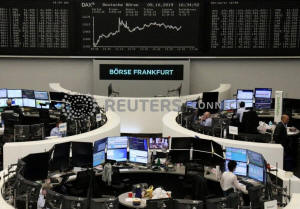Dollar takes a dive, euro catapulted higher as U.S.-China talks start
 Send a link to a friend
Send a link to a friend
 [October 10, 2019]
By Marc Jones [October 10, 2019]
By Marc Jones
LONDON (Reuters) - A dive in the dollar
catapulted the euro higher and flattened stocks on Thursday, as the
first U.S.-China trade talks since July and a report accusing the
European Central Bank chief Mario Draghi of going rogue jostled for
attention.
Markets were bombarded from all sides by denials and counter-denials on
both the U.S.-China trade talks and the countdown to Brexit, by Turkey's
military push into Syria and by a blizzard of weak data stretching from
Japan to France.
Asia had enjoyed a broadly positive finish but European stocks then
spent their opening spell dithering [.EU] as the more serious action
took place in the currency markets, where the euro <EUR=EBS> suddenly
popped to a two-week high above $1.10 versus the dollar.
The greenback was weaker across the board - partly due to market chatter
about a currency pact with China to stop devaluation - but there was
plenty else too.
The Financial Times reported that the ECB had restarted its bond-buying
program last month despite objections of its own officials, a further
sign of how the move has reopened divisions within the institution.

"The view on the currency story could be swinging here," said Saxo
Bank's head of European currency strategy, John Hardy, "And the market
is sensing that euro-dollar is the pressure point."
Perhaps the main mover overnight was a rally in China’s offshore yuan,
which strengthened to its best levels in more than two weeks after a
Bloomberg report that said U.S. and Chinese officials were reviving a
currency pact first mooted earlier this year that stops further tariff
hikes in return for commitments to hold the yuan stable.
As well as the ECB resistance to Draghi's latest moves, Hardy said that
could also have a read-across for the euro, with the United States
expected to lay out sanctions next week in retaliation for Europe's past
aid for planemaker Airbus.
U.S. S&P 500 mini futures <ESc1> traded down 0.1%, with a large part of
early losses cut after the New York Times reported that Washington would
soon issue licenses allowing some U.S. firms to supply non-sensitive
goods to China's Huawei Technologies.
MSCI's broadest index of Asia-Pacific shares outside Japan
<.MIAPJ0000PUS> gained 0.1% while Japan's Nikkei <.N225> rose 0.45%.
Shanghai shares <.SSEC> also rose 0.8%.
"DIRE" TRADE SITUATION
Top U.S. and Chinese negotiators were scheduled to meet in Washington on
Thursday and Friday to try to end a bruising 15-month-old trade war.
Without significant progress, U.S. President Donald Trump is set to hike
the tariff rate on $250 billion worth of Chinese goods to 30% from 25%
next Tuesday.
[to top of second column]
|

The German share price index DAX graph is pictured at the stock
exchange in Frankfurt, Germany, October 9, 2019. REUTERS/Staff

"Barring any surprise today, it looks like their talks are breaking
down. The tariff (rate) will be hiked. The situation looks dire,"
said Norihiro Fujito, chief investment strategist at Mitsubishi UFJ
Morgan Stanley Securities.
China is unlikely to be willing to make an easy compromise with a
U.S. president who seems increasingly vulnerable to domestic
political pressure as opposition Democrats seek to impeach him,
analysts also said.
U.S. Democratic presidential contender Joe Biden called for the
impeachment of Trump for the first time in a deepening partisan
fight over a congressional investigation of the Republican
president.
"Mr. Trump's recent impeachment risk has turned the timetable
against him," Chi Lo, senior economist at BNP Paribas Asset in Hong
Kong, wrote in a report to clients.
"While China is not eager to reach a trade deal, Mr. Trump is,
however, under pressure to get at least a temporary deal done to
help his re-election bid before his impeachment risk rises and the
U.S. economy weakens further," Chi said.
U.S. Treasuries yield slipped back after having risen to 1.594% on
Wednesday, pressured partly by this week's heavy bond supply.
The 10-year Treasuries yield dipped to one basis point to 1.577%
<US10YT=RR> although the ECB chatter helped push euro zone yields
slightly higher.
The price of front-end Fed funds rate futures has been gained on
increasing bets on more rate cuts by the U.S. Federal Reserve. The
November contract <FFX9> is almost fully pricing in a 0.25
percentage point cut on Oct. 30.
In commodities, oil prices also dipped on wariness over U.S.-China
talks. Brent crude <LCOc1> futures fell 0.15% to $58.23 a barrel
while U.S. West Texas Intermediate (WTI) crude <CLc1> lost 0.11% to
$52.53 per barrel.

Copper <CMCU3> rose as much as 1.1% to $5,749 a tonne, however,
after falling 0.3%. It looked set to be its best day in a month.
(Reporting by Marc Jones; Editing by Gareth Jones)
[© 2019 Thomson Reuters. All rights
reserved.]
Copyright 2019 Reuters. All rights reserved. This material may not be published,
broadcast, rewritten or redistributed.
Thompson Reuters is solely responsible for this content. |